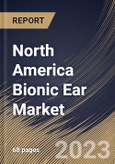Bionic ears are getting better all the time for people with severe hearing loss. People with one-sided deafness can use a dental appliance and bone-anchored hearing aids (BAHAs). The "good" side receives sound on the deaf side and then transmits it through the skull bone. There are numerous of these, which are regarded as prosthetic devices. By translating sound into electrical signals transmitted to the brain, cochlear implants aid those with serious to profound hearing loss. Electrodes are placed inside the cochlea, a cone-shaped canal in the inner ear, and a transmitter is put beneath the skin behind the ear. A newer, more precisely positioned, smaller version of a typical cochlear implant has been created and is currently undergoing FDA trials.
A series of biological translations transform air vibrations into nerve impulses as sound moves from its source to the ears and, ultimately, the brain. When hearing loss happens, it's typically because important connections towards the end of this chain, between the auditory nerve and the ear's cochlear cells, are damaged. By inserting a variety of small electrodes that activate the auditory nerve, cochlear implants are intended to fill in this gap in the hearing system of persons with profound deafness.
According to a Statistics Canada report released in October 2021, tinnitus, hearing loss, or both disorders impacted 60% of Canadians aged 19 to 79. In addition, tinnitus and hearing loss were more prevalent in men than in women. The small and medium-sized firms (SMEs) that comprise most of the Canadian medical device sector are extremely diversified. Therapeutic devices, medical device research and development, diagnostic device manufacture, and regulation of these devices are among the main activities. In addition, because of the growing elderly population, the medical device industry is seeing increased demand. As the number of people with hearing loss diseases rises and medical technology advances, it is likely that these nations will use bionic ears and other forms of therapy. As a result of the aforementioned factors, the market is anticipated to expand significantly throughout the projected period.
The US market dominated the North America Bionic Ear Market by Country in 2022 and would continue to be a dominant market till 2029; thereby, achieving a market value of $764.9 Million by 2029. The Canada market is experiencing a CAGR of 9.9% during (2023-2029). Additionally, The Mexico market would showcase a CAGR of 9% during (2023-2029).
Based on End-use, the market is segmented into Hospitals, Clinics, and Others. Based on Type, the market is segmented into Cochlear Implant, Auditory Brainstem Implants, and BAHA/BAHS.Based on countries, the market is segmented into U.S., Mexico, Canada, and Rest of North America.
The market research report covers the analysis of key stake holders of the market. Key companies profiled in the report include Cochlear Ltd., MED-EL GmbH, Sonova Holding AG, Zhejiang Uniview Technologies Co., Ltd. (Hangzhou Jiaozhi Technology Co., Ltd.), Boston Scientific Corporation, Medtronic PLC, Amplifon S.P.A., Starkey laboratories, Inc., GN Store Nord A/S (GN Hearing A/S), and WS Audiology A/S.
Scope of the Study
By End-use
- Hospitals
- Clinics
- Others
By Type
- Cochlear Implant
- Auditory Brainstem Implants
- BAHA/BAHS
By Country
- US
- Canada
- Mexico
- Rest of North America
Key Market Players
List of Companies Profiled in the Report:
- Cochlear Ltd.
- MED-EL GmbH
- Sonova Holding AG
- Zhejiang Uniview Technologies Co., Ltd. (Hangzhou Jiaozhi Technology Co., Ltd.)
- Boston Scientific Corporation
- Medtronic PLC
- Amplifon S.P.A.
- Starkey laboratories, Inc.
- GN Store Nord A/S (GN Hearing A/S)
- WS Audiology A/S
Unique Offerings
- Exhaustive coverage
- The highest number of Market tables and figures
- Subscription-based model available
- Guaranteed best price
- Assured post sales research support with 10% customization free
Table of Contents
Companies Mentioned
- Cochlear Ltd.
- MED-EL GmbH
- Sonova Holding AG
- Zhejiang Uniview Technologies Co., Ltd. (Hangzhou Jiaozhi Technology Co., Ltd.)
- Boston Scientific Corporation
- Medtronic PLC
- Amplifon S.P.A.
- Starkey laboratories, Inc.
- GN Store Nord A/S (GN Hearing A/S)
- WS Audiology A/S








